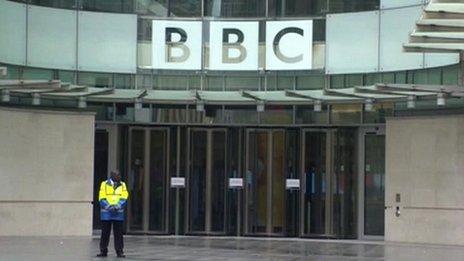BBC annual report 2012-13 at a glance
- Published

The BBC has experienced some tumultuous times over the past year
The BBC's annual report has been published for the financial year 2012-13.
Here are some of the key points from the review, which is conducted by the BBC's management and the corporation's regulatory body, the BBC Trust.
The BBC delivered £580m in efficiency savings under the continuous improvement programme, bringing the cumulative total saved since 2008/09 to £2bn.
This exceeded the 3% year-on-year efficiency savings target set by the trust.
BBC News
BBC News continued to be the most popular news broadcaster, with 82% of UK adults watching, listening or reading the BBC's coverage.
Scores for trust in the BBC were hit by the Savile story and related issues with Newsnight. Nevertheless, BBC News remains by far the most trusted source of news in the UK, with 58% of the public picking the BBC as the one source they trust the most, followed by ITV on 14%.
The trust said it was concerned about the gradual decline in audience numbers for current affairs programmes on television in recent years and about the degree of ambition and quality of current affairs programming. It will look at this as part of a review into its television services.
Radio
47m adults listen to live radio every week - around 90% of the population - and live radio accounts for over a billion listening hours each week. Overall, BBC radio reached in excess of 35 million people - the third time it has done so in its history - in 2012.
Digital radio continued to grow, with a third of all hours spent listening to live radio being via a digital platform.
6 Music achieved a record weekly reach of 1.9 million between October and December 2012, with 1xtra and 4 Extra reaching record numbers of listeners.
The Trust pointed out that hours of listening amongst younger adults have continued to decline, however, which remains a challenge for all radio stations.
Radio 4 continues to struggle to reach more people outside the south of England, including the devolved nations. The trust has asked the executive to do more to extend reach across the whole of the UK.
Television
The BBC continued to reach almost every household in the UK, with 96% of people accessing BBC content via TV, radio and online every week.
54m watched BBC events coverage last summer, the year of the Queen's Diamond Jubilee and the London Olympics, with millions more watching around the world.
There was a 48% growth for BBC One HD and 1.9bn requests to watch TV programmes through iPlayer.
23.9m watch original British drama on the BBC each week, with 84% of viewers agreeing that BBC Four's content is distinctive and offers something new.
The BBC has committed to spending 50% of its network TV programming budget on productions outside London by 2016, with 17% coming from Wales, Scotland and Northern Ireland.
The trust said while the BBC has made some progress in improving audience perceptions in the nations and regions, viewers and listeners around the UK still want to be better represented in programming.
It said that BBC One needs to showcase distinctive types of high quality content that audiences expect from the BBC, with recent drama The Village cited as a good example. The trust said it believes BBC One has scope for more of this kind of ambitious programming.
And with dedicated children's content moving across to digital channels CBBC and CBeebies, the trust said BBC One and Two must ensure children are still catered for on these flagship channels.
BBC Online and Red Button
BBC Online reached 48.1% of the population.
The red button was a success story of the BBC's coverage of London 2012, as each of the 24 streams of Olympic content was watched by over 100,000 people, allowing the BBC to reach an audience of 24m.
In 2013, the BBC will focus on personalisation of services.
The Trust said that whilst the number of people accessing BBC Online grew slightly, the number of different devices used grew significantly in the year 2012-2013.
Perceptions of the quality of BBC Online improved after a significant drop last year, following the relaunch of two of its most popular sites, the homepage and BBC Sport.
Management Pay and Star Salaries
The BBC is continuing to reduce the cost of its top talent. Overall payments to performers paid more than £500,000 was reduced by £4.2m from £16.5m in 2011/12 to £12.3m in 2012/13.
Top talent now makes up 6% of overall talent spend, down from 12% in 2008/09.
At the end of March 2013, the BBC had reduced its senior manager headcount by 195 (30.5%) and its pay-bill by £24.7m (31.4%).
It is committed to achieving further reductions in the senior manager pay bill of around £5.5m and reductions in headcount of around 30 by 2015.
The BBC has agreed with the trust to continue with the policy of discounting senior manager salaries against the commercial market by between 20% and 80%.
The Trust said it has seen good progress in reducing the amount paid to the most senior people, but there is further to go.
The BBC continued to generate significant efficiency savings and early indications suggest that this has been achieved without a detrimental impact on overall audience numbers or appreciation scores.
But the trust said the recently revealed costly failure of the BBC's digital media initiative (DMI) shows that further improvements are still needed.
It said it was deeply concerned about the money lost and the way the project was managed and reported to the trust.
Its research this past year concluded that 57% of people think that the BBC represents good value for money, which means around four in ten do not.
- Published16 July 2013